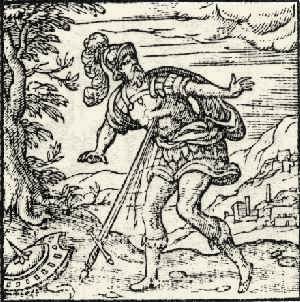Brutus and Cassius
In Julius Caesar, Shakespeare omits or simplifies much of the politicking that went on after the death of Caesar and before the establishment of the triumvirate. Antony controlled Rome alone for a time, but the city divided into two factions once again as Octavius, Caesar's adopted heir, gained popular support. Then the Senate backed Octavius in order to expel the increasingly tyrannical Antony.
Antony was declared a public enemy and driven from Italy after a battle at Modena (April, 43 B.C.). Poorly provisioned, he led his soldiers across the Alps into Gaul, and there won over Lepidus' forces to his own command (although he charitably allowed Lepidus to keep the name of general).
Similarly the "quarrel" scene between Brutus and Cassius (4.3) is a combination of two meetings of the co-conspiritors. The final battle, with its near-victory for Brutus, and the series of misunderstandings that bring about the deaths of both Cassius and Brutus, is a condensed version of a series of battles that took two days.
In other parts of the play Shakespeare remained remarkably close to North's translation of Plutarch. Click for a comparison* of two passages.
Julius Ceasar is also notable for its sensitivity to classical philosophy, particularly that of the stoics and epicureans.
Listen to Cassius speaking to Brutus on individual responsibility and the stars.
Footnotes
-
Shakespeare and Plutarch
Shakespeare condensed Plutarch freely in order to make the history more dramatically intense, but there are many places where he follows the translation of Sir Thomas North almost word for word:
Howbeit he was of such a strong nature, that by patience he would overcome any adversity: and the heavier fortune lay upon him, the more constant shewed he himself. . . And therefore it was a wonderful example to the soldiers, to see Antonius, that was brought up in all fineness and superfluity, so easily to drink puddle water, and to eat wild fruits and roots: and moreover it is reported, that even as they passed the Alps, they did eat the barks of trees, and such beasts as never man tasted of their flesh before.
Caesar: Antony,
Leave thy lascivious wassails. When thou once
Was beaten from Modena, where thou slew'st
Hirtius and Pansa, consuls, at thy heel
Did famine follow, whom thou fought'st against
(Though daintily brought up) with patience more
Than savages could suffer. Thou didst drink
The stale of horses and the gilded puddle
Which beasts would cough at. Thy palate then did deign
The roughest berry on the rudest hedge.
Yea, like the stag when snow the pasture sheets,
The barks of trees thou browsed. On the Alps
It is reported thou didst eat strange flesh,
Which some did die to look on. And all this
(It wounds thine honour that I speak it now)
Was borne so like a soldier that thy cheek
So much as lanked not.
(Antony and Cleopatra 1.4.55-71)The passage from Plutarch is taken from Thomas North's translation of Plutarch: Shakespeare's Plutarch. 1875. Ed. Walter W. Skeat. New York: AMS, 1972.
